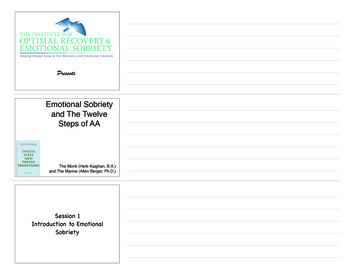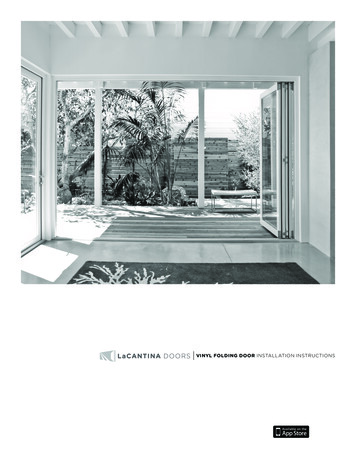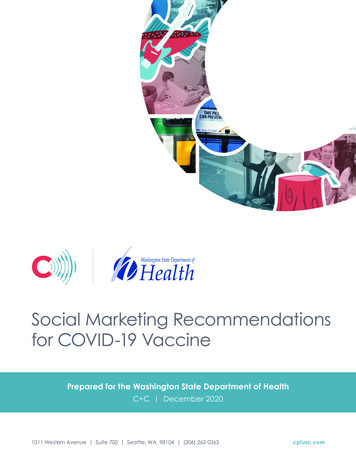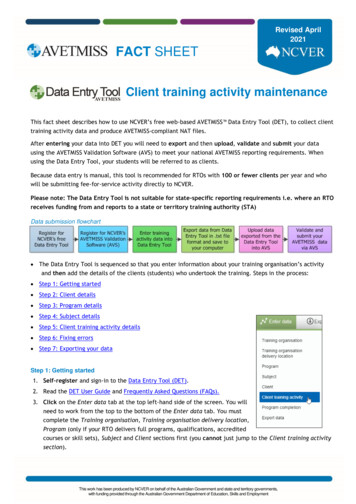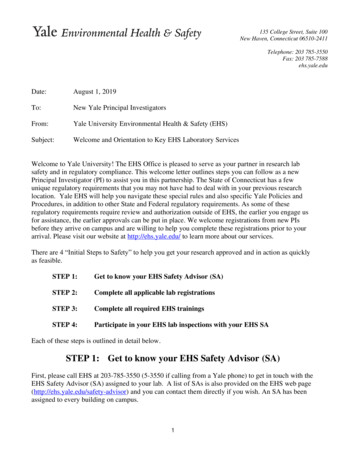
Transcription
135 College Street, Suite 100New Haven, Connecticut 06510-2411Telephone: 203 785-3550Fax: 203 785-7588ehs.yale.eduDate:August 1, 2019To:New Yale Principal InvestigatorsFrom:Yale University Environmental Health & Safety (EHS)Subject:Welcome and Orientation to Key EHS Laboratory ServicesWelcome to Yale University! The EHS Office is pleased to serve as your partner in research labsafety and in regulatory compliance. This welcome letter outlines steps you can follow as a newPrincipal Investigator (PI) to assist you in this partnership. The State of Connecticut has a fewunique regulatory requirements that you may not have had to deal with in your previous researchlocation. Yale EHS will help you navigate these special rules and also specific Yale Policies andProcedures, in addition to other State and Federal regulatory requirements. As some of theseregulatory requirements require review and authorization outside of EHS, the earlier you engage usfor assistance, the earlier approvals can be put in place. We welcome registrations from new PIsbefore they arrive on campus and are willing to help you complete these registrations prior to yourarrival. Please visit our website at http://ehs.yale.edu/ to learn more about our services.There are 4 “Initial Steps to Safety” to help you get your research approved and in action as quicklyas feasible.STEP 1:Get to know your EHS Safety Advisor (SA)STEP 2:Complete all applicable lab registrationsSTEP 3:Complete all required EHS trainingsSTEP 4:Participate in your EHS lab inspections with your EHS SAEach of these steps is outlined in detail below.STEP 1: Get to know your EHS Safety Advisor (SA)First, please call EHS at 203-785-3550 (5-3550 if calling from a Yale phone) to get in touch with theEHS Safety Advisor (SA) assigned to your lab. A list of SAs is also provided on the EHS web page(http://ehs.yale.edu/safety-advisor) and you can contact them directly if you wish. An SA has beenassigned to every building on campus.1
An EHS SA is the: Main connection between labs and EHS. SAs are safety professionals who can helpanswer any safety-related questions.Safety liaison assigned to your lab to help you get your lab started from a safety andcompliance standpoint and to continue to work with you during your time at Yale.Lead EHS representative of a team of three SAs that are assigned to your laboratory(your SA has two back-up SAs that may be called upon when your primary SA isunavailable).We advise that you request a start-up meeting with your assigned SA as soon as feasible.Specifically, your SA will: Provide you with all applicable registrations you may need and assist where needed,Help assess all the required and recommended lab safety trainings for your proposedresearch activities,Conduct or schedule any lab orientations you may need, such as an onsite review ofhazardous waste collection, storage and disposal,Schedule a variety of walk-through lab inspections with you or your designatedcontact for lab safety to reinforce safe lab practices and work with you to achieveregulatory compliance.STEP 2: Complete all applicable lab registrationsThe majority of your research will require registration with EHS. In addition, certain types ofresearch will require formal authorization prior to initiation. The following tables outline the variousEHS and other applicable required registrations that must be completed before the work is started.The tables are provided by EHS category.Radiation SafetyRegistration Radioactive thorization-registrationDescriptionOnline registration form to obtain authorization toperform experiments involving radioactivematerials and/or radioactive sources.Research with radioactive materials cannot beinitiated without authorization from theRadiation Safety Committee.Applicant must be a Yale faculty member with aminimum rank of Research Scientist and priorexperience with radioactive materials.2
X-Ray Generating EquipmentAll X-Ray Generating Equipment must beregistered with the State of CT Department ofEnergy and Environmental Protection (CT DEEP)prior to its use. EHS maintains the CT DEEPregistration of all Yale x-ray equipment.All class 3B and 4 lasers that are purchased oracquired and brought on campus must be registeredwith Yale’s Laser Safety Officer.http://ehs.yale.edu/x-rays Lasershttp://ehs.yale.edu/lasersChemical SafetyRegistration DescriptionChemicals Requiring EHS Pre-ApprovalSome high hazard or highly regulatedchemicals require approval by hemicals- prior to purchase.ehs-approval.pdfResearch Protocol Chemical Safety ReviewThis form is required to be completedfor work involving highly iles/chemical- chemicals as identified in the Chemicalsafety-research-protocol.pdfHygiene Plan. Cyanide Handling Review Form idereview.pdfRegistration Applications for Controlled sThis form must be completed andreviewed by the SA prior to purchase orwork with sodium or potassium cyanide.All controlled substances must beregistered and licensed by the State ofCT and the federal DEA.Biological SafetyRegistration DescriptionBiological General egistration Registration of Experiments Involving rDNA orSynthetic Nucleic nucleic-acid-molecules.pdf3Required for all PIs. The initial biosafetyregistration form serves as a trigger forother registrations. NetID and passwordrequired to access registration.Required if conducting non-exemptrDNA research. Non-exempt rDNAresearch may not be conducted untilauthorization is provided by the YaleBiological Safety Committee.
Registration of a Human Gene Transfer ClinicalTrialRequired for the use of recombinant orsynthetic nucleic acids in humansubjects. Will require authorization fromhttp://ehs.yale.edu/human-gene-transferthe Yale Biological Safety Committeeand the Yale Human InvestigationCommittee prior to authorization.Request to Use Infectious AgentsThe application for work with humanpathogens at Yale University. Willhttp://ehs.yale.edu/human-pathogensrequire authorization by Yale EHS andthe State of CT Department of ationHealth prior to authorization.Request to use Risk Group 3 pathogens/SelectIn addition to the requirements for humanAgentspathogens as noted above, research withRisk Group 2 pathogens will also authorization from the Yale BSL3Subcommittee. Work with Select Agentswill require authorization by the U.SGovernment prior to initiation.Purchase and Installation of Biosafety CabinetsBiological safety cabinets at Yale arecertified annually through a contract biosafety- an accredited certification company. EHScabinet-add-remove.pdfwill coordinate and schedule the annualcertification for each cabinet on contract.In addition to the annual -cabinetsrequirement, all biological safetycabinets must be certified after initialinstallation, after moving and followingsome repairsEHS IntegratorLink EHS criptionUse EHS Integrator to: Update your lab andassistant data; Respond to survey findings; Requestbiomedical waste pickup services; Submit clean airdevice contract PTAEOs; and much more. ContactEHS if you need help using this new web tool.4
Personal Protective Equipment (PPE)Links DescriptionPPE On-line Assessment me/Index PPE s/ppe-policy.pdf PPE iles/ppe-procedure-labs.pdfA PPE hazard assessment is the evaluation of thepersonal protective equipment requirements for aspecific activity or work environment, so that theindividual is protected from exposure to ahazardous material, condition or process.This Policy applies to all faculty, staff, students,affiliates and visitors where PPE is required basedon their job duties, other activities, potentialexposures or work environment. This Policy doesnot preclude the addition of more stringent PPErequirements for a specific activities or workenvironment.This Procedure describes how to implement YaleUniversity’s Personal Protective Equipment Policyin a laboratory.STEP 3: Complete all required EHS trainingsEnsure that you and your staff complete all required lab safety training prior to handling hazardousor regulated materials. In many circumstances, completion of required training is part of the lab andindividual authorization for the use of hazardous materials. The bulk of our training courses are nowavailable online and can be accessed from the EHS web page (ehs.yale.edu) by clicking on thetraining icon at the top of the screen. Once in our Training site, please scroll through thealphabetical listing of EHS Training courses.Radiation SafetyTraining Radiation Safety Orientation Part I andPart sic-conceptsRadiation Safety for X-Ray yDescriptionMandatory two (2) part training: Basic and Applied,for personnel working with radioactive material orfrequenting an area where radioactive materials arestored or used.Anyone who wishes to use X-Ray GeneratingEquipment must take the “Radiation Safety for XRay Equipment” training class. All users of X-Ray5
Generating Equipment are required to weardosimetry badges.Laser Safety TrainingLaser Safety Awareness training reviews basic lasersafety information for all four classifications ofhttp://ehs.yale.edu/trainings/laser-safety- lasers. The training information should be viewedtrainingprior to using any class 3b or 4 lasers at Yale.Radiation Safety AwarenessDesigned for researchers who don’t work directlywith radioactive materials, but who frequent orhttp://ehs.yale.edu/trainings/radiationshare lab space with individuals that do.safety-awarenessChemical SafetyTrainingDescription Lab Chemical Safety rainingHazard communicationtraining Hazardous Chemical Waste chemical-wastetraining Formaldehyde Safety Training rainingOrganolithium Compounds TrainingRequired for those individuals whowill be handling hazardouschemicals and packaging them forcollection by Yale EHS for disposal.Required for staff handlingFormaldehyde with iles/formaldehyde- /organolithium-compounds Required for all researchers workingin laboratories at Yale forconformity with the OSHALaboratory Standard.Required for all others withexposure to chemicals in a nonlaboratory setting (i.e. healthcare,animal care and use staff, police,office staff)Universal Waste TrainingRequired for all laboratory personnelwho may work with organolithiumcompoundsOn how to properly recycle usedelectronics or other universal te6
Biological SafetyTraining Biosafety Part I and II gs/biologicalsafety-training-part-ii Bloodborne Pathogens for lab and ng-clinical-personnel DescriptionRequired for researchers handling biologicalmaterials in the laboratory, including rDNAresearch materials, defective pathogen vectors,Risk Group1 and 2 research materials, toxins, andhuman pathogens. Satisfies compliance withYale, State of CT, NIH, and CDC requirementsand recommendations.Required for those with workplace exposure tohuman blood, body fluids, tissues, includingprimary or continuous human cell lines. Alsoextended to those who utilize equipmentpotentially contaminated with these materials.This course satisfies the Occupational Safety andHealth Administration’s requirements forcompliance with the OSHA BloodbornePathogens Standard.Biosafety Level 3 TrainingRequired only for those researchers who willwork with Risk Group 3 pathogens, or work fety Level 3 (BSL3) laboratories, or workon protocols utilizing BSL3 work practices.Trainees must be nominated for the course by anexisting approved Yale PI conducting BSL3research and meet have completed all otherapplicable Biosafety training courses.PI Orientation to the Yale Biological Safety Required for all PIs of Yale Laboratories, thisManualtraining provides an overview of all of thebiosafety program regulatory and Yale ion- program requirements.biosafety-manualShipping Biological SubstancesOnline training classes to assist shippers ofhazardous biological materials (Category A and Bhttp://ehs.yale.edu/shipping-biologicalInfectious Substances) and Exempt BiologicalmaterialsSpecimens document their required USDepartment of Transportation and InternationalAir Transport Association training prior toshipping in commerce.7
TB Exposure ntrol Biological Safety Cabinets (Safe -cabinets Lab Biomedical Waste TrainingAn infection control course designed for thosewith clinical responsibilities with patient contact.It raises awareness of the signs and symptoms ofTB and reviews initial response and exposurecontrol procedures for potential or known TBcases.The course will describe the different type ofbiological safety cabinets, review how they aretested and certified, and outline safe workingpractices to minimize risk of spreadingcontaminants and maximize worker protectionagainst biohazards. This course is recommendedfor anyone who must use a biological safetycabinet as part of their research.Additional information regarding the properhandling procedures for biologicallycontaminated waste for the Medical School andScience Hill campusesMedical School s/biomedical-waste-procedures-medschool.pdfScience Hill s/biomedical-waste-procedures-sciencehill.pdfSTEP 4: Participate in lab inspections with the EHS SASafetyInspection Quarterly Radiation Safety Inspection Annual Chemical Safety Inspection Annual Biosafety InspectionDescriptionConfirms that radioactive materials are handledsafely. Verifies that procedures are conducted inconformity with the authorized proceduresapproved by the Radiation Safety Committee.Documents compliance with Yale, State andNuclear Regulatory Commission requirements.Reviews the handling procedures and storage ofhazardous chemicals. Checks that appropriatepersonal protective equipment is used for the levelof risk involved. Verifies conformity with theUniversity’s Chemical Hygiene Plan.Examines the laboratory facility and work practicesused for handling biohazards to ensure compliancewith Yale, State of CT, OSHA, CDC and NIHbiosafety regulations, standards and guidelines.8
Hazardous Waste Satellite AreaAccumulation AuditReviews waste handling and storage procedures forevaluation with US Environmental ProtectionAgency and State of CT Department of Energy &Environmental Protection.We hope that this welcome and orientation letter is helpful in getting your lab off to a positive start.We also appreciate any feedback on the orientation information and encourage any comments youhave that will help us improve the form or any aspect of our services. We look forward to workingwith you as your partner in safety and compliance. We wish you success in your research aims andefforts and look forward to greeting you upon your arrival. If you have any questions, please do nothesitate to contact us at 203-785-3550 and ask to speak with your EHS Safety Advisor.9
The bulk of our training courses are now available online and can be accessed from the EHS web page (ehs.yale.edu) by clicking on the training icon at the top of the screen. Once in our Training site, please scroll through the alphabetical listing of EHS Training courses. Radiation Safety Training Description
